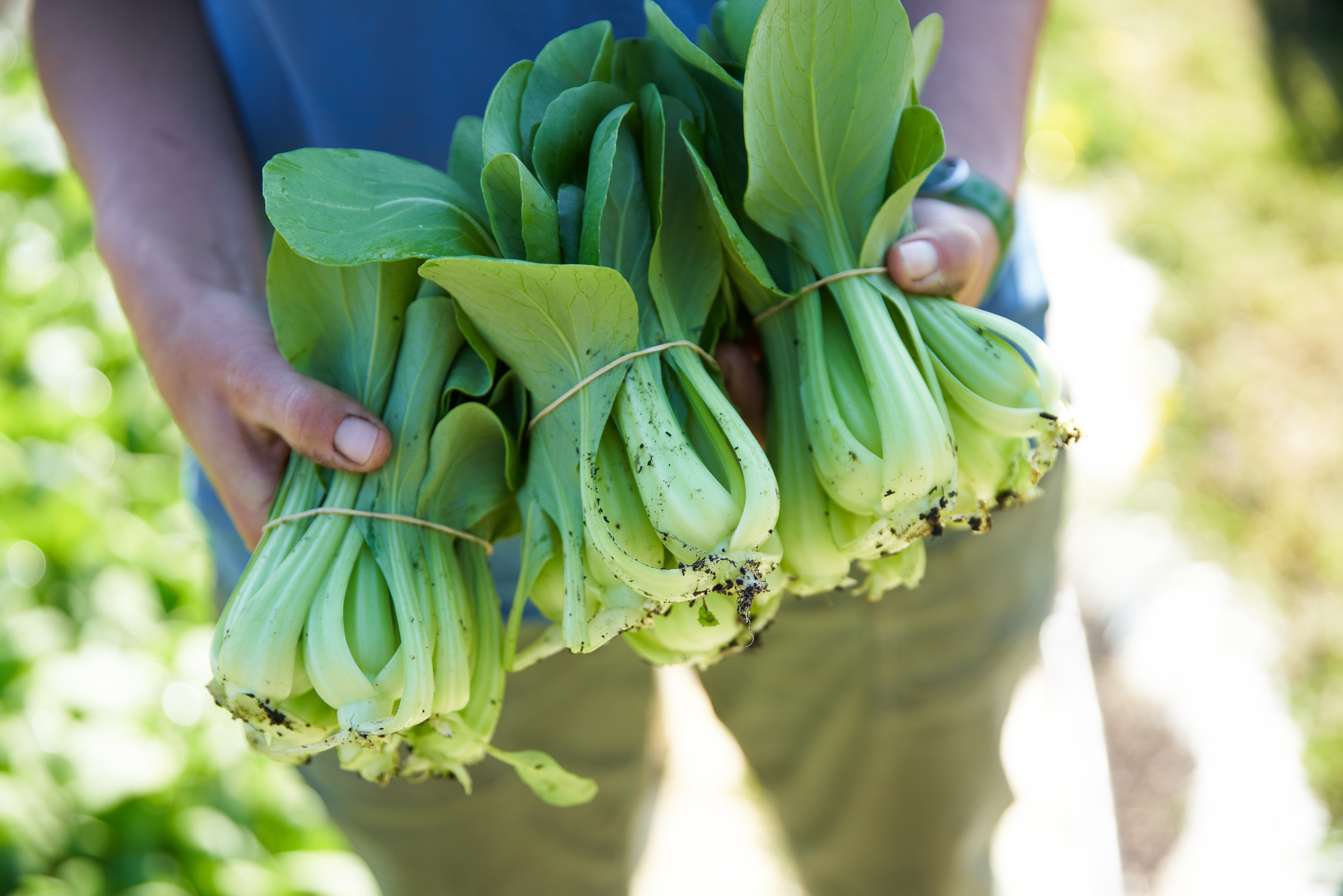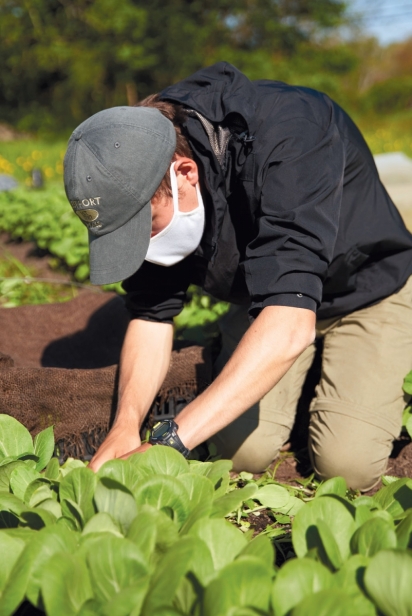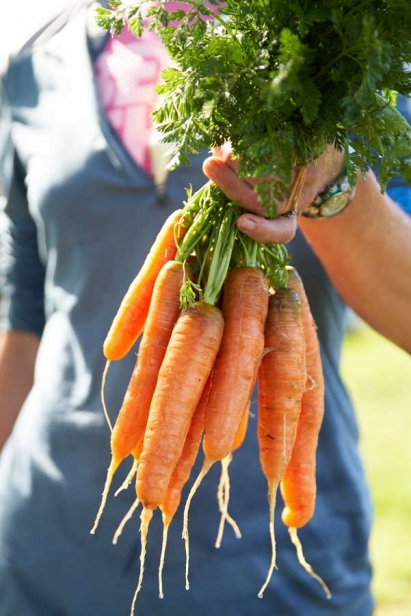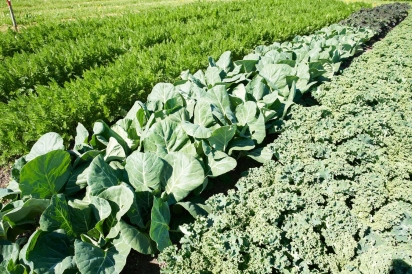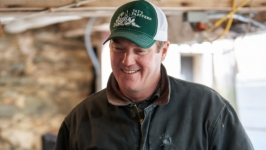Growing Stronger, Together
Farming in a Global Pandemic Sharpens the Focus on the Future of Local Ag
For nearly a decade, Kelli and Mike Roberts have offered seasonal produce bundles from their farm in Tiverton to a loyal customer base, which generally hovers around 150 people. That number has more or less remained the same over the years, until this spring, when demand for local food soared, and the couple had to create a CSA wait list for the first time.
“I’d love to let [more] people join,” Kelli Roberts said, “but we don’t want to dilute the quality of this farm share program [or CSA] we’ve developed over the years.”
This interest, while reassuring to many farmers, is also overwhelming. Roots Farm, like many farms around the state, is a small operation and doesn’t have the capacity to meet such an increase in demand for locally produced food—a direct result of Covid-19 and the unprecedented events of this spring. As of late May, the farm’s CSA wait list had surpassed 50 people.
Earlier in the year, before farmers markets reopened around the state, Kelli and Mike were among the farmers able to quickly pivot to online orders via a digital marketplace. Essentially, they repurposed their CSA order form into a general order form, and began offering curbside pickup, which “took right off,” Kelli Roberts said.
She and other farmers linked this growing customer base to a newfound appreciation for local food. “Their eyes have been opened to how good and fresh this stuff is,” she said.
Kelli and Mike already had plans to expand the farm’s growing capacity, which she said is a coincidence, although it’s too soon to know if an even greater expansion will be necessary in the near future or if the increase in demand will remain. “I don’t know if we even have time to wrap our heads around it,” she said.
For Ken Ayars, Rhode Island Department of Environmental Management’s chief of agriculture, the events of this spring are an opportunity to turn this renewed—and, in many cases, newfound— interest in locally grown food into a more sustainable system, specifically one that supports local food production and also creates a shorter supply chain.
“Rhode Island has always had a strong, vibrant food system,” Ayars said. “[We’re] building on a platform that’s been around for a long time.”
He noted that plans in the works for years, even decades, have in some ways been accelerated by Covid, namely those focused on shortening the state’s supply chain. “It’s interesting where people want to go when the larger food system is challenged,” Ayars said, noting Rhode Islanders went straight to their source, whether for vegetables, meats, dairy products or fresh fish. While no one can be sure what the future holds, Ayars thinks it’s likely that Covid will continue to influence food systems for some time to come.
“The ‘new normal,’ in many ways, is closer to the current normal because we’ve been moving this way for years,” he said.
Ayars’ biggest concern going forward is how to help wholesale producers whose main markets disappeared overnight, like farmers who grow for restaurants and schools, or fishermen who rely on export sales. Overcoming this obstacle, which involves a transition from wholesale to retail, will take some time.
“[We need to] spread out and diversify the market,” Ayars said, which means assuming it may not reappear as it once was, and also capitalizing on the energy that surfaced with the increased demand this spring. “There’s more work to be done.”
Since the onset of Covid-19, Ayars has been hosting weekly calls related to food access and the needs of the agriculture community, bringing people together across government agencies and grassroots organizations, from farmers to local food advocates. The food access Zoom meetings were held three times a week for two months, and are now held twice weekly, and the agriculture call happens once a week (and fisheries on another day, led by Bob Ballou).
Those calls were able to transpire with relative ease—and led to people working together, often rather quickly, to create tangible solutions to pressing problems—largely because of pre-existing relationships. “There was a lot of trust and knowledge in place,” said Sheri Griffin, co–executive director of Farm Fresh RI, noting the advantage of living in a small state. “When this crisis descended, we already had a pretty strong community, and this has strengthened that a great deal.”
Much of Griffin’s work, and the work of Farm Fresh, a nonprofit organization, is to create more equity within the state’s food system, through advocacy work and hands-on programming.
“Covid is uncovering a lot of fault lines around a ton of different things,” she said, especially the supply chain. “For the first time in many, many people’s lifetimes, they’ve gone into a grocery store and seen empty shelves.
“People are reeling a bit from understanding the food system is not a factory,” she continued, “it’s a living, breathing organism.” The meaning of “no farms, no food” has been elevated from a catchy slogan to a fact of life, one evident as meat or dairy products remain scarce and the number of eggs available for purchase is limited. The result is people reaching out to local growers and producers, signing up for CSAs and farm deliveries.
A long-term issue that Griffin would like to see addressed is access to affordable farmland, while also making farming more accessible to people of color, especially those from diverse backgrounds and cultures. Covid, she noted, exposed a lot of racial inequities that have long-existed within the system, like how “food is a social determinant of health,” and she hopes this focus persists in a way that creates real change.
Kim Coulter is among the farmers who has been listening in on the weekly agriculture calls, where talk has often been had about the effects of Covid-19 on the meat industry, namely a backlog at local and regional processing centers. She, along with her husband, Bill; son, Josh; and sister, Nina Luchka, own and operate Stoney Hill Cattle Farm in Charlestown, which has been in her family since 1955. It sits on about 180 acres, and, on any given day, has about 125 layer hens, 150 broiler chickens, 40 head of cattle and 20 to 25 hogs.
Typically, Coulter makes an appointment for meat processing eight months in advance. However, this spring several appointments were pushed back because of an increase in demand following the shutdown of large meat plants in other parts of the country. “It’s been daunting,” she said, noting the processing plants have been having trouble keeping up with this demand, and also incentivizing workers who might make more money collecting unemployment.
This spring, the farm saw an increase in demand that it was barely able to meet. Coulter said they ran out of chickens way before expected, and processed hogs into pork sooner than planned. For two weeks this spring, the farm was out of stock completely.
“We’ve never been out of product before in such a short period of time,” she said. A lot of people have recently visited the farm, she added, and were surprised to discover a retail market, which has existed for the past 10 years.
Another noticeable change this spring came in the form of buying patterns. Coulter noted that more people are requesting larger cuts of meat, something she hasn’t seen in nearly 15 years. Instead of choice cuts, people are asking for a quarter, or even half, cow.
“We haven’t had this demand for large quantities for a while,” she said. “Things are turning back, back to when people want to know they have the security of food on the table, to feed the whole family,” Coulter noted, hitting on a trend of recent months, one where the way of the future seems to be rooted in the traditions of the past.
She and her husband, along with farmers from seven other farms, created the Rhode Island Raised Livestock Association, working for years to establish a processing facility in the state, but it never quite came to fruition; there were a lot of challenges to overcome. However, it’s possible that with so much increased focus on local food, the creation of such a plant could be easier now, Coulter said.
In the meantime, local support—from other farmers, the general public, from Ayars, whom Coulter describes as “a saving grace to all of us”—has been tremendous. “We’re all there to watch everyone’s back,” she said.
Heidi Quinn, the executive director of the Rhode Island Farm Bureau, is among those people cosistently looking out for farmers around the state.
“Agriculture is a fragile economy, period,” she said, with or without Covid, which has only added to the system’s fragility. “This is something that really hit a group that, for the most part, is always in a struggle.”
Quinn has been watching as some farmers, like the Robertses at Roots Farm, had the pre-existing technological savvy to quickly pivot and adapt to digital demand, while others didn’t even know where to begin. The result has been some farmers stopping altogether and others reporting that they’ve sold more product than previous springs.
Like the others, Quinn hopes the demand for local food is lasting. “In 2020, people should know where their food is coming from,” she said, but “people just don’t.”
In addition to supporting food producers, Quinn also noted the need to support agritourism, like corn mazes and pick-your-own crops, which feed into the sales of other farm products. By her estimates, 70 to 90% of a farm’s income “could come from agritourism and associated sales.” She, along with Ayars and others, spent much of this spring working to create guidance that will safely support this industry for the foreseeable future, meaning creating plans for maintaining social distance and best practices amidst a public health crisis. Such modifications and adaptations are imperative to the success of the local food system, she said.
For Rich Pederson, the head farmer at Southside Community Land Trust (SCLT), as well as a board member of the Hope Street Farmers Market in Providence, having to tackle such problems has been an opportunity for innovation and also a sign of resilience. SCLT “serves people in economically challenged urban neighborhoods where fresh produce is scarce,” and owns or directly manages 21 community gardens in Providence, Pawtucket and Central Falls, as well as another 37 gardens through various partnerships.
In late May, SCLT held its 28th annual plant sale. This year, for the first time, the event was reconfigured as a curbside grab-and-go sale. Despite this sudden reinvention, “it went really well,” Pederson said, noting there was a lot of support, which he believes is an indicator of more and more people wanting to grow their own food—a direct result of Covid and its impact on the food system.
“The farmers markets and the plant sale, to me, are the same idea [in terms of] having space to congregate over food—food to grow, food to eat,” Pederson said, noting that in both cases people have showed up in impressive numbers to support the cause. “Food growing is essential.”
As far as new practices at the community gardens, hand-washing stations have been installed, which he thinks is actually a good addition long-term. Also, he noted that a significant number of plants were donated to area food pantries, through the help of nonprofit Hope’s Harvest, so fresh herbs and produce can be among the pantry offerings.
“If people need to grow food, let’s give them opportunities to do it,” he said, observing that there has been a strong sense of unity and support across and among different groups in recent months, which he applauds.
Ayars would agree, and added that this spring has paved the way for potential, and the possibility of an even stronger food system. “I think we’ll come out of this better than before,” he said. “What we had was functioning and not disrupted to the degree we’re seeing now. These disruptions, and this pressure, will cause some changes to happen that are good for the future of the long-term food system.”


